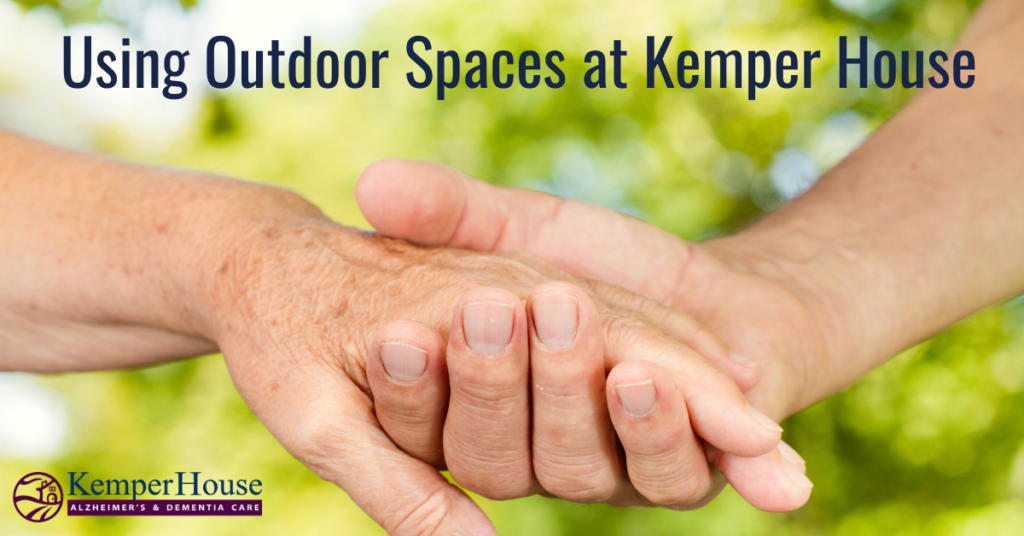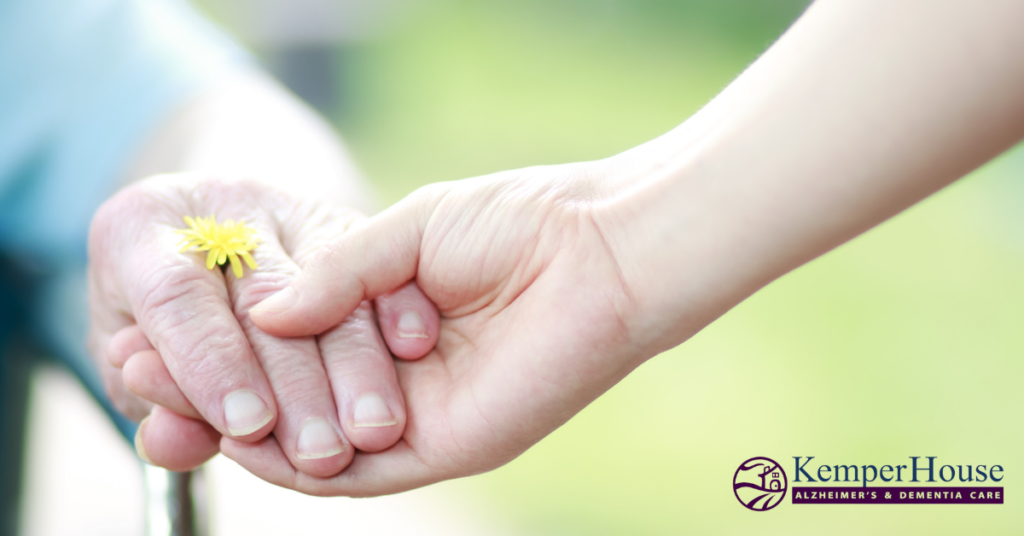
Using Outdoor Spaces at Kemper House
When Betty Kemper envisioned the Kemper House care program and building design, she considered all the ways Kemper House would care for the whole person. At Kemper House, we don’t just take care of residents’ medical needs, we care for their emotional, spiritual, and physiological needs as well.
The environment is an important part of that care, and the buildings were thoughtfully designed to offer safe and stimulating outdoor environments. The following is information on the benefits of outdoor activity, and some ideas for using our outdoor spaces while balancing independence and safety.
Benefits of outdoor activity
When people can freely use outdoor areas, agitation, and aggression are reduced, independence is promoted, and memory recall is more likely to occur. Gardening is stimulating, gives sensory pleasure, and taps into past life activities and experiences. Quality of life improves with an outdoor space or garden giving people the chance to:
- be physically active
- feel unrestrained
- be more in touch with nature
- be alone if they want to be
- socialize if they want to
- do meaningful things that make them feel at home.
Outdoor areas can offer privacy, areas for sociability, activities for different skills and abilities, and a place to go to break up the day. For some people, the outdoor world has spiritual or religious meaning.
Walking has physical and psychological benefits, and being outdoors lets people have safe sun exposure for vitamin D intake. Vitamin D is needed for musculoskeletal health and reducing the risk of bone fractures.
Balancing independence & safety
A dementia-friendly facility aims to support independence and mobility in a safe and secure environment. While people must be safe, and the facility secure, a person’s right to free movement and non-restraint must be respected. Reduce risks through good design.
There are many ways to increase safety while encouraging independence and mobility outside.
- Design a path with a continuous route.
- Arrange furniture so people can sit and rest.
- Use handrails where needed.
- Make walking paths level and hazard-free.
- Choose low-glare surfaces.
- Choose non-trip, non-slip paving.
- Use orientation and way-finding cues, including color and scent.
Using & enjoying outdoor spaces
Many familiar activities take place in gardens and outside spaces and are a normal part of everyday life. They include:
- hanging clothes to dry
- gardening
- raking leaves
- composting
- washing cars
- working in a shed
- sharing a meal
- cooking on a barbecue
- feeding birds
- playing with children
- relaxing on the porch
These simple activities might be built into a person’s care plan, be used by staff on a day-to-day basis, or be part of a planned or special event.
For a home-like environment, arrange daily living around familiar tasks relating to people’s life histories and cultural backgrounds. If mobility issues limit outdoor activity, people can still enjoy sunshine, and fresh air, watching birds, sitting with others, or eating meals outside.
People with dementia benefit from carefully planned outdoor settings for quiet and more noisy experiences; active experiences can meet the needs of people at different stages of impairment. People may quietly connect with the natural environment sitting under a tree or puttering in a garden bed. Or they may want to meet friends and family in the garden, wash the car, or hammer in nails in the garden shed.
Gardens give people options to control their personal space for privacy or social contact. For privacy, put seats singly beside paths and in special outside spots. For social contact, group chairs and use other outdoor features.
-Information taken from http://www.health.vic.gov.au


